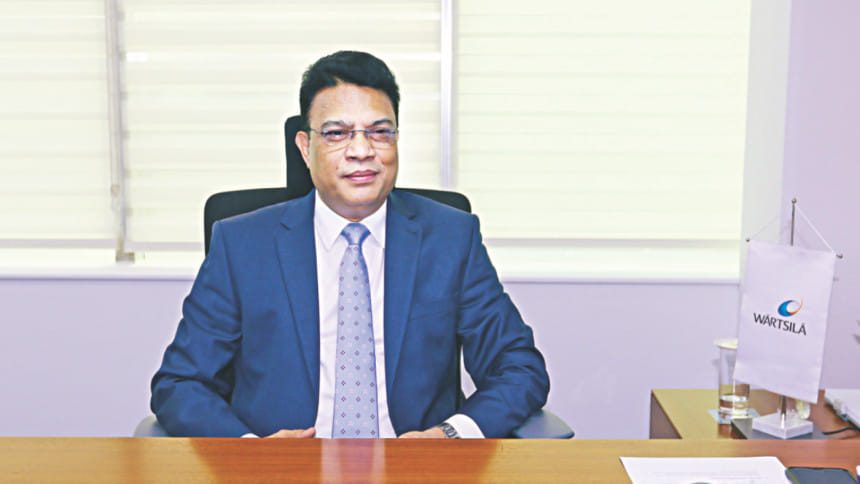Smart power generation to ensure fuel efficiency

The households consume the most electricity in Bangladesh -- and not the industrial units -- and their level of consumption varies from season to season.
For example, during the rainy season, all air-conditioners are shut down and the country is back to base load only. In the evenings, however, when all the lights and air-conditioners start running again, the demand for power goes up drastically.
“For countries like Bangladesh, smart power generation is a very good solution,” said Jillur Rahim, managing director of Wärtsilä Bangladesh.
Established in Finland in 1834, Wärtsilä today is a global leader in manufacturing and servicing power sources and other equipment in the marine and energy markets.
The company has delivered equipment for more than 4,700 plants ranging from 10MW to over 600MW in 176 countries.
Its specialty is in providing smart power generation plants, which are based on multiple internal combustion engines that are able to run on any gaseous or liquid fuel, including bio-fuel.
Other than being able to provide industry-leading fuel efficiency and operational flexibility, smart power plants can start in 30 seconds and ramp to full output in less than 5 minutes.
To give an example of a classic smart power generation plant in Bangladesh, Rahim spoke about the United-Ashuganj 200MW combined cycle modular power plant.
“The beauty of this plant is that you don't lose efficiency when demand fluctuates. In Bangladesh where we have this type of fluctuating demand pattern, our technology is very suitable.”
Wärtsilä has been present in Bangladesh since the early 1990s. As businesses grew, it set up a full-fledged office in 1998 to cater to a sizeable number of power plants.
In Bangladesh, Wärtsilä's main business activity is to provide complete lifecycle solutions for the power sector.
As of today, Wärtsilä is committed to supporting 4,200MW of power in Bangladesh, covering more than 25 percent of the national grid's power.
Along with strong local support, Wärtsilä has helped build the majority of the power plants of big groups such as Summit, United and Orion as well as state-run Bangladesh Power Development Board and Rural Power Company Ltd.
They also work with new local entrants to the power sector to help meet the electricity demand in Bangladesh.
Wärtsilä is also supporting some of the local companies, such as Meghna Group, Lafarge Surma and Heidelberg Cement by building captive power plants for their industrial needs.
“We provide onsite support engineers, online data and remote-monitoring enabled advanced support, as well as immediate response from Wärtsilä's experts to ensure safe operations of power plants,” Rahim said.
The number of power plants has trebled over the years, with more new initiatives underway as the government is working towards ensuring electricity supply to every household.
The power plant owners appreciate and value when they see they are getting quality products, on-time delivery and implementation of projects and power plants.
“A lot of our orders are repeat orders because of the goodwill we have in Bangladesh,” said Rahim, who has been with Wärtsilä Bangladesh since the very beginning and was appointed its managing director in 2014.
On the human resources development front, Wärtsilä Bangladesh has been heavily investing in people and bringing in the latest know-how to the country. It has trained several hundred engineers and personnel for over two decades.
Many engineers who worked with Wärtsilä are now serving other power generation companies in Bangladesh and abroad including the Middle East, Africa, Indonesia and Australia.
“We also have an engineer from Bangladesh who is working in the R&D department of Wärtsilä in Finland. This shows the extent of skills our engineers have,” said Rahim, who studied marine engineering at Bangladesh Marine Academy.
Wärtsilä Bangladesh has workshops in Gazipur and Chittagong. It has recently set up a warehouse in Gazipur for spare parts in order to ensure quick support for customers.
In the event of breakdown, customers do not have to wait for months for their facility to come back into operations for a lack of critical parts, which could also result in them paying huge amounts of penalties.
“This will give our customers the peace of mind and allow them to maintain the availability of the plants,” said Rahim, who also holds an MBA in finance from the Institute of Business Administration.
He also shared some insights into the changing global energy scenario.
The demand for electricity in emerging markets has continued to increase -- particularly
in Asia.
The role of storage technology and hybrid solutions, including solar generation, is increasingly being discussed globally. This rising shift towards renewable energy also creates more opportunities for Wärtsilä.
“The more renewables are added to any grid, the more the need for flexible power generation technology to keep the system balanced. Wärtsilä's technology will definitely help to manage the grid.”
Wärtsilä is also a recognised global leader in gas engine technology and offers solutions and services throughout the entire LNG distribution chain.
“Bangladesh has steadily been growing and Wärtsilä is happy to have helped power that growth. Together, we can grow.”

 For all latest news, follow The Daily Star's Google News channel.
For all latest news, follow The Daily Star's Google News channel. 



Comments